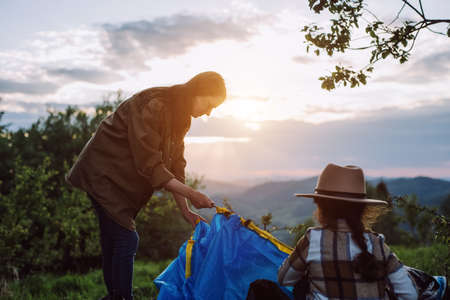Introduction to Plastic-Free Camping
Camping in the beautiful British countryside offers families a wonderful way to reconnect with nature and each other. Yet, with every trip, it’s easy to accumulate plastic waste—from disposable cutlery to single-use packaging. As awareness of environmental issues grows in the UK, more campers are embracing the idea of plastic-free camping. Reducing plastic waste on your camping adventures not only helps protect the stunning landscapes we all cherish but also supports local wildlife that can be harmed by discarded plastics. By making mindful choices and opting for sustainable gear, you set a positive example for children and create lasting memories rooted in care for our planet. Choosing a plastic-free approach isn’t just about reducing rubbish; it’s about enjoying the great outdoors responsibly and ensuring these precious spaces remain unspoilt for generations to come.
2. Choosing Sustainable Tents and Shelters
Finding the right tent or shelter is a big part of any camping adventure, and when aiming for a plastic-free experience in the UK, your choices can make a real difference. Eco-friendly tents are now more accessible than ever, with many local British brands and schemes supporting sustainability. Here’s how you can sleep soundly under the stars while being kind to the planet.
Eco-Friendly Tent Materials
Traditional tents often rely on synthetic fabrics like polyester or nylon, both derived from plastic. However, several sustainable alternatives are available in Britain:
| Material | Description | UK Availability |
|---|---|---|
| Organic Cotton Canvas | Durable, breathable, and biodegradable; often used for bell tents and yurts. | Widely available from UK glamping suppliers. |
| Hemp Fabric | Strong, mould-resistant, and environmentally friendly; less common but emerging in eco-camping markets. | Specialty eco-brands and custom orders. |
| Recycled Materials | Tents made from upcycled or recycled fabrics (e.g., PET bottles). | Select UK outdoor brands and sustainable retailers. |
Shelter Alternatives Beyond Tents
If you want to go beyond traditional tents, consider these eco-conscious options found across Britain:
- Bivvy Bags: Minimalist shelters using natural fibres or recycled materials, perfect for solo campers who travel light.
- Cotton Tarps: Versatile and free from plastics, these can be pitched in numerous ways for group or family camping.
Hire Schemes and Local Eco-Brands
If investing in new gear isn’t practical, hiring equipment is a sustainable choice that reduces waste. Many UK companies offer rental schemes featuring eco-friendly tents and accessories—ideal for one-off trips or trying before you buy. Look out for local eco-brands such as Boutique Camping, Bell Tent Boutique, and The Canvas Tent Company, all offering options that support British craftsmanship and sustainable practices.
Tips for Plastic-Free Camping Comfort
When choosing your tent or shelter, check that zips, toggles, and guy lines are also plastic-free—some brands offer wooden toggles or metal pegs as alternatives. By making mindful choices about your shelter, you’re not just protecting nature but also creating cherished family memories under the green British sky.

3. Plastic-Free Cooking and Eating Essentials
When it comes to camping in the UK, preparing and enjoying meals together is often at the heart of family adventures. Choosing plastic-free cooking and eating essentials not only reduces waste but also makes for a healthier, more mindful experience in nature. Let’s explore some fantastic alternatives that are both practical and eco-friendly, with a special focus on products available from UK-based brands.
Reusable Cookware for the Campsite
Swap single-use or plastic-coated cookware for stainless steel or enamel pots and pans. These materials are durable, easy to clean, and can last for generations—a true investment for any British camper. Falcon Enamelware, a classic UK favourite, offers sturdy enamel dishes perfect for campfire cooking. Stainless steel options from Lifeventure or Black+Blum are also widely available and well-suited to outdoor use.
Eco-Friendly Cutlery Choices
Instead of disposable plastic knives and forks, opt for bamboo or stainless steel cutlery sets. Look out for UK brands like Wild & Stone or The Little Green Orca, which offer attractive, reusable options packaged without plastic. Some sets even come with handy travel pouches made from natural fabrics—perfect for keeping things tidy when you’re on the go.
Sustainable Food Storage Solutions
Packing up leftovers or carrying snacks doesn’t have to mean reaching for cling film or zip-top bags. Beeswax wraps from Beeswax Wrap Co., a beloved British maker, provide a brilliant alternative for wrapping sandwiches or covering bowls. For airtight storage, consider stainless steel containers from Elephant Box—a UK company known for its robust and long-lasting lunchboxes. Glass jars with clip lids (such as those by Kilner) are another traditional choice that works brilliantly for storing dry goods and pre-prepped meals.
By choosing these reusable, non-plastic options sourced from local businesses, your family can enjoy delicious meals on your camping trips while treading lightly on the beautiful British countryside.
Eco-Friendly Toiletries and Cleaning Supplies
Choosing the right toiletries and cleaning supplies is a key part of planning a plastic-free camping trip in the UK. Not only do these products help protect our beautiful British landscapes, but they also ensure that your family’s outdoor adventures are gentle on the environment. Let’s explore some top tips for making your campsite routine both sustainable and safe for little ones.
Biodegradable Toiletries: Gentle Choices for Nature
Traditional toiletries often contain plastics or microplastics, which can harm local wildlife and pollute water sources. When packing for your getaway, opt for biodegradable alternatives that break down naturally and are safe to use near rivers, lakes, and woodland areas commonly found across UK campsites.
| Product Type | Eco-Friendly Alternative | UK Brand Suggestions |
|---|---|---|
| Shampoo & Conditioner | Solid shampoo bars (no plastic bottles) | Lush, Ethique |
| Soap | Coconut oil soap bars (packaged in paper/card) | The Little Soap Company, Friendly Soap |
| Toothpaste | Toothpaste tablets in glass jars or tins | Georganics, Truthpaste |
| Deodorant | Bicarbonate of soda deodorant in cardboard tubes or tins | Pit Putty, Wild Refill Deodorant |
Plastic-Free Cleaning Products for Campsite Living
Campsite clean-ups can be fun and teach children about respecting nature. Swap out single-use wipes or plastic sponges for reusable cloths made from bamboo or organic cotton. For washing up, look for plant-based washing-up liquids in refillable containers or use solid dish soap bars—a simple switch that makes a big difference!
Quick Tips for Plastic-Free Cleaning:
- Bamboo dish brushes: Sturdy and compostable at end of life.
- Natural sponges: Grown from loofah plants—perfect for scrubbing pots after a hearty camp meal.
- Laundry strips: Lightweight, pre-measured sheets that dissolve in water without leaving any plastic waste.
- Bicarbonate of soda & vinegar: Versatile staples for cleaning surfaces safely around children.
A Family Ritual: Tidy-Up Time Together!
Turn cleaning into a positive family moment—sing a song while tidying up or make it a game to see who can spot the most litter to pick up (with gloves, of course!). These small changes not only keep your site pristine but also help little campers grow up with eco-friendly habits. With every wipe, wash, and scrub done sustainably, you’re helping to protect the wild beauty of the UK for future explorers.
5. Clothing and Outdoor Gear for a Greener Trip
When planning your plastic-free camping adventure in the UK, choosing sustainable clothing and outdoor gear can make all the difference. Opting for well-made, eco-friendly items not only reduces waste but also supports responsible manufacturing.
Choose Natural Fibres Over Synthetics
Select clothing made from organic cotton, British wool, or hemp rather than synthetic fabrics like polyester or nylon, which are essentially forms of plastic. Brands such as Finisterre, based in Cornwall, offer weatherproof jackets and knitwear made from ethically sourced British wool—perfect for those unpredictable Lake District showers! Tencel and bamboo are also excellent alternatives for base layers due to their breathability and minimal environmental impact.
Support Local and Ethical Brands
Look out for homegrown brands like Rapanui on the Isle of Wight, which creates durable camping tees and hoodies using renewable energy and plastic-free packaging. Millican, based in the Lake District, produces rucksacks and accessories crafted from recycled materials and natural fibres—ideal for hiking or storing your essentials without plastic zips or trims.
Sustainable Footwear and Accessories
For sturdy boots or sandals, consider companies such as Vivobarefoot, who use recycled materials and plant-based components while designing footwear that’s built to last on muddy trails. Swap out plastic ponchos for waxed cotton rain capes or invest in a classic Barbour jacket—a timeless British staple that’s both repairable and plastic-free.
Eco-Conscious Camping Kit
Don’t forget about other kit essentials: choose stainless steel water bottles, beeswax wraps instead of cling film, and wooden utensils over plastic ones. For sleeping bags or mats, seek out those filled with organic wool or recycled materials. These thoughtful choices help ensure your outdoor experience leaves no harmful trace behind—just happy memories and a lighter footprint on the beautiful British countryside.
6. Tips for Planning a Sustainable UK Camping Getaway
Practical Packing: What to Bring and What to Leave Behind
Packing for a plastic-free camping trip in the UK doesn’t need to be complicated, but it does require a bit of thoughtful planning. Start by making a checklist of essentials such as reusable water bottles, stainless steel or bamboo cutlery, beeswax wraps for food storage, and cloth shopping bags. Opt for multipurpose items—like a metal mug that can double as a bowl—and avoid single-use plastics altogether. Remember, less is more; packing light means carrying less waste and leaving a gentler footprint on Britain’s beautiful landscapes.
Minimising Waste at Every Step
Reducing your waste starts before you even set off. Choose package-free groceries from local markets and bulk stores, and pre-portion snacks in reusable containers. Plan meals ahead to avoid leftovers that might be difficult to store without plastic. While at camp, make use of designated recycling bins and compost food scraps if facilities are available. Always follow the “Leave No Trace” principle: take everything you brought back home, including biodegradable rubbish if there are no composting options.
Supporting Local Businesses with an Eco-Conscious Approach
One of the joys of camping in the UK is discovering small village shops, farm stalls, and local artisans. When possible, support these businesses by purchasing locally made goods—look for organic produce, handmade soaps, and locally roasted coffee packaged without plastic. Many independent retailers are now committed to reducing their environmental impact and will appreciate your mindful choices.
Extra Thoughtful Touches for Families
If you’re camping with children, involve them in sustainable habits: encourage them to collect litter they find on trails (safely!), teach them how to identify recyclables, or let them help choose plastic-free snacks for the trip. These small activities not only protect the countryside but also foster lifelong respect for nature.
Enjoying the Journey Responsibly
Finally, remember that sustainable camping is about more than just gear—it’s about enjoying Britain’s wild places respectfully. Stick to established paths to preserve delicate habitats, keep noise levels low to protect wildlife, and share your eco-friendly tips with fellow campers. By planning thoughtfully and embracing plastic-free alternatives, you’ll create happy memories while ensuring these treasured spots remain unspoilt for future generations.


